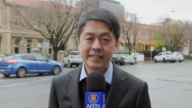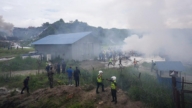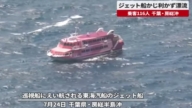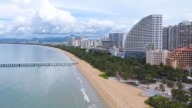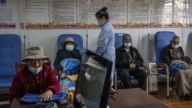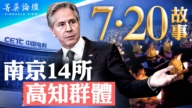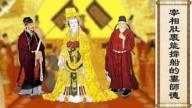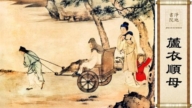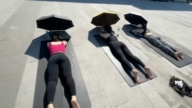【新唐人2013年11月06日讯】上个月,美国非政府组织“自由之家(Freedom House)”在报告中披露,中共yabo88官网审查延伸海外,日前,原“加拿大华人协进会全国总会”副会长冯玉兰在多伦多的一次公开演讲中也指出,近20年来,中共当局通过国安等情报部门,对具有战略意义的国家实施六种策略,争夺舆论控制权。请看报导。
自香港移民加拿大、现居多伦多的冯玉兰在演讲中表示,由于加拿大拥有中国奇缺的资源,如﹕石油和稀有重金属,以及制约未来发展的淡水资源等,而成为中共国际媒体战略的重要目标。
《法国国际广播电台》引述冯玉兰的话报导说,中共为控制在多伦多、温哥华和蒙特利尔等,这些华人集中居住的大城市媒体,主要实施了六种策略,包括收购有影响力的媒体,控制媒体文章内容,或干脆全资创办新媒体;或用间接方式影响本地媒体对中国的报导;或采用亲疏有别、内外有别,以不同的政策对待不同的媒体;以及对媒体管理层和一线记者施压;人员渗透;网络入侵。而为了更有效的控制,中共往往采取多种策略并进的方式。
“加拿大民主中国阵线”主席盛雪表示,由于中共一贯的性质和它的本性,它一直都在进行所谓的大外宣和软实力着陆,不断的向西方民主国家进行渗透。
“加拿大民主中国阵线”主席盛雪:“按它们自己的话说,叫做所谓争夺话语权,它希望用它中共的意识形态,不单单是影响它自己的国民、影响在海外的侨民,同样要影响西方的民主国家。西方民主国家信仰的基本普世价值是自由、人权、民主、法制,中共正好和这个普世价值相反,如果不去争夺这个整个的这样的意识形态,它知道它自己的政权是不可能长久的。”
2008年北京奥运之前的3月,西藏拉萨爆发藏人大规模抗议活动,遭到中共镇压,当时西方主流媒体包括《BBC》、《美国之音》等给予高度关注和报导。
加拿大主要的英文报纸《星报》对这个事件也做了一个特别报导,可它的合作伙伴《星岛日报》在把这篇文章转载、翻译成中文时,进行了加工和修改歪曲,引起当地一些团体的反弹。
盛雪:“修改了大标题,中间加了一些立场非常鲜明、而且是非常不公正的小标题;将英文报导当中的一些比较中肯的采访和一些披露事实真相的部分,完全给删除了,加上了中文报纸自己的一些主观评论在里面。”
另外,北京当局还利用独家资源施压加拿大主流媒体,甚至是加拿大英文媒体。
2008年“加拿大广播公司CBC”为争取北京奥运转播权,在中领馆的压力下,把一部关于中国活摘人体器官的记录片,删除了最敏感的内容后播出。
冯玉兰指出,中共以不同的政策对待不同的媒体,特别是打压批评中共的媒体,如把《新唐人电视台》和《大纪元时报》拒于中领馆和社区活动的门外。
据2007年《人民报》消息,2007年9月9号,在澳洲悉尼举办“亚太经合峰会(APEC)”的最后一天,一位已经获准参加APEC闭幕仪式的《大纪元》记者莎露-马西森,在中共施压下,被阻止采访会议现场。
盛雪:“确实有一些媒体是一定会为自由、人权、民主、法制,捍卫这样的价值的,那么在这种情况下,中共就会用它的国家实力来进行干预、破坏捣乱,甚至对这些媒体进行屏蔽和打击,像《大纪元》、《新唐人》这样的媒体,在中共的眼里,始终都是它最主要的敌人。”
10月19号,在加拿大多伦多召开了“全球支援中国和亚洲民主化第六届论坛大会”,在会议之前和期间,相关人士都遭到中共的网络及人身攻击。
盛雪:“包括对我本人那些污言秽语、一种抹黑谩骂,甚至是伪造色情照片,用移花接木的方式,用我的面貌,然后用色情照片的那个底,然后放到网上去,这个做法当然就是不希望看到我们这些力量,有一种联合合作的这样一种形势。”
冯玉兰在深感媒体被渗透、自由言论空间被剥夺的危机下,她提议设立独立机构,专门研究中共对加拿大媒体的渗透问题,并定期发布报告以警醒世人。
采访编辑/易如 后制/陈建铭
The CCP Employs Six Strategies to Control Western Media
Freedom House has reported on how the Chinese Communist
Party’s media controls extend past China’s borders.
Recently, in a public speech in Toronto, activist Feng Yulan
also identified six strategies employed by the CCP
over the past 20 years via its intelligence department and
national security to infiltrate and control overseas media.
Feng Yulan is an immigrant to Canada from Hong Kong.
She said a recent speech that Canada has become
an important strategic target of international media control
to the CCP because it possesses the resources China needs,
such as oil, rare metals, and freshwater.
Radio France Internationale cites Feng Yulan addressing
the six strategies the CCP uses to control Canadian media
in cities with large Chinese populations,
such as Toronto, Vancouver and Montreal.
They are: To control media content through buying influential
media companies or simply running a new one;
to influence indirectly how local media report about China;
to play preference with differential treatment
and policies toward different media;
to pressure the management and front-line media reporters;
to infiltrate the media personnel;
to intrude via the internet.
In order to facilitate the control,
the CCP often take the approach of multiple strategies.
Sheng Xue president of the Canada based political group,
Federation for a Democratic China,
says the CCP has always tried to infiltrate the West
through propaganda and soft power.
Sheng Xue, president of Federation for a Democratic China:
“In its own words, this is a fight for the right to speak,
and ideological power over Chinese people, overseas diaspora,
and the Western world.
The West believes in the fundamental universal values of
freedom, human rights, democracy, and the rule of law,
while the CCP precisely opposes these universal values.
The CCP knows that if it doesn’t fight for ideological control,
its regime cannot last."
Take the mass Tibetan protests in Lhasa (Tibet’s capital)
prior to the 2008 Beijing Olympic Games as an example.
Many Western media such as the BBC and VOA carried
intensive reports on the crackdown on the protests.
Toronto Star also carried a special report.
Canada-based Chinese newspaper Sing Tao
carried an altered translation of the Star’s article,
causing some local groups to rally.
Sheng Xue : “They changed the title,
added some clearly unfair subheadings,
removed some of the pertinent disclosure of the truth,
and added their own subjective comments to the article."
Beijing authorities have also put pressure on the use of the
exclusive resources to mainstream Canadian media.
In order to obtain broadcast rights during the 2008 Beijing
Olympics, the Canadian Broadcasting Corporation (CBC)
deleted the most sensitive contents of a documentary
on live organ harvesting in China before airing it,
due to pressure from the Chinese consulate.
Feng Yulan pointed out the CCP’s different policies
towards different media, and particularly ones that criticize
the CCP, such as New Tang Dynasty TV and the Epoch Times.
They are suppressed by the CCP and refused by
Chinese consulates and the Chinese community activities.
Chinese media, Renminbao, reported in 2007 that on
Sept. 9 that year, on the last day of the Asia-Pacific Economic
Cooperation summit (APEC) in Sydney, Australia,
Epoch Times reporter Sarah Matheson, who had received
permission to enter for the closing ceremony,
was rejected to enter the conference
due to the pressure from the CCP.
Sheng Xue: “There really are media that will defend the
values of freedom, human rights, democracy, and rule of law.
In this case, the CCP will use its state power to intervene
and even create disturbance to the media.
Media such as the Epoch Times and NTD are
definitely its main enemies. “
On Oct. 19, the Sixth forum of the Global Support
for the Democratization in China and Asia was held in Toronto.
Many participants were attacked in person or online
by the CCP before and on the day of the meeting.
Sheng Xue: “They’ve cursed at me, tried to smear my name,
and even put fake porn pictures with my face on the internet.
They try to weaken our momentum and our joint cooperation."
Feng Yulan says she’s very concerned about the danger of
media infiltration and free speech deprivation by the CCP.
She proposes that an independent organization regularly
investigate and publish alert reports to the world
on the CCP’s penetration of Canadian media.
Interview & Edit / Yi Ru Post-production /




